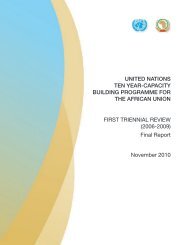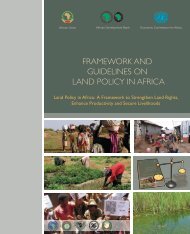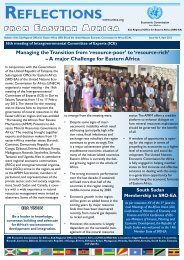A Decade of NEPAD - Economic Commission for Africa - uneca
A Decade of NEPAD - Economic Commission for Africa - uneca
A Decade of NEPAD - Economic Commission for Africa - uneca
You also want an ePaper? Increase the reach of your titles
YUMPU automatically turns print PDFs into web optimized ePapers that Google loves.
48 A <strong>Decade</strong> <strong>of</strong> <strong>NEPAD</strong>: Deepening <strong>Africa</strong>n Private Sector and Civil Society Ownership and Partnership<br />
2009 AFRICAN BUSINESS TOP 500 – AGRO INDUSTRY COMPANIES<br />
RANK IN 500 COMPANY COUNTRY TURNOVER US ($bn)<br />
17 SAPPI SOUTH AFRICA $5.30<br />
29 SAB MILLER SOUTH AFRICA SOUTH AFRICA $3.96<br />
53 TIGER BRANDS SOUTH AFRICA $2.40<br />
66 PIONEER FOODS GROUP SOUTH AFRICA $1.73<br />
71 ALTADIS MAROC MOROCCO $1.58<br />
74 CEVITAL ALGERIA $1.55<br />
100 DISTELL GROUP SOUTH AFRICA $1.18<br />
102 AFGRI SOUTH AFRICA $1.15<br />
116 ILLOVO SUGAR SOUTH AFRICA $1.01<br />
119 NIGERIAN BREWERIES NIGERIA $0.96<br />
What is missing in <strong>Africa</strong>, even in South <strong>Africa</strong>, whose<br />
economy comprises 40% <strong>of</strong> the <strong>Africa</strong>n economy, is a<br />
robust and dynamic tier <strong>of</strong> medium sized enterprises. The<br />
10% <strong>of</strong> the private sector represented by <strong>Africa</strong>’s transnationals<br />
easily account <strong>for</strong> nearly 50% <strong>of</strong> gross domestic<br />
production. Supporting private sector enterprise growth<br />
and development is where the opportunity – and greatest<br />
challenges lie.<br />
An additional component <strong>of</strong> the <strong>Africa</strong>n private sector that<br />
has historically been being under resourced and lacking<br />
adequate capacity is the sector comprised <strong>of</strong> organized<br />
business bodies on the continent. However, in the past<br />
fifteen years, significant ef<strong>for</strong>t has been undertaken to<br />
strengthen <strong>Africa</strong>n chambers <strong>of</strong> commerce, and also <strong>Africa</strong>n<br />
trade, sector and pr<strong>of</strong>essional associations.<br />
The ef<strong>for</strong>ts begun in the late 1980s to promote private sector<br />
involvement in economic development, also suggested that<br />
in addition to adhoc and in<strong>for</strong>mal consultations between<br />
private sector and government, there should be <strong>for</strong>mal<br />
mechanisms <strong>for</strong> engagement that <strong>of</strong>fered membership in<br />
economic and social councils.<br />
While some countries embraced this concept and established<br />
designated <strong>for</strong>ums to help foster public-private<br />
dialogue and partnership, (including Ghana, Botswana,<br />
Senegal, Malawi and Tanzania) most <strong>Africa</strong>n countries<br />
have not instituted such structures nor consistently worked<br />
to include their private sectors in their economic decision<br />
making programmes.<br />
Yet, organized business across <strong>Africa</strong> is continuing to grow,<br />
and beyond just national structures, increasingly, regional<br />
structures (<strong>of</strong>ten aligned with the regional economic communities)<br />
are <strong>for</strong>ming to ensure that <strong>Africa</strong>n private sector<br />
voices are heard as policies are developed and their related<br />
interests are taken into consideration during deliberation<br />
about economic policy and programmes.<br />
Furthermore, a few business structure are also aligning<br />
national apex organs to be able to develop a coherent pan-<br />
<strong>Africa</strong>n voice to engage with organs such as the <strong>Africa</strong>n<br />
Union and <strong>NEPAD</strong> and to interface with bilateral business<br />
groups such as the U.S.’ Corporate Council on <strong>Africa</strong> and<br />
France’s CIAN.<br />
In November 2008, the UN <strong>Economic</strong> <strong>Commission</strong> <strong>for</strong><br />
<strong>Africa</strong> helped facilitate the All <strong>Africa</strong>n Chambers <strong>of</strong> Commerce<br />
Conference, a continental gathering <strong>of</strong> national apex<br />
chambers <strong>of</strong> commerce from the Democratic Republic <strong>of</strong><br />
Congo, Ethiopia, Ghana, Libya, Nigeria, South <strong>Africa</strong> and<br />
Tanzania (and representatives <strong>of</strong> chambers from Burkina<br />
Faso, Burundi, Kenya, Lesotho, Madagascar, Mozambique,<br />
Sierra Leone, Sudan, Swaziland, Uganda and Zimbabwe)<br />
under the theme “Private Sector: A Venue <strong>for</strong> <strong>Africa</strong>n<br />
Renaissance”.<br />
The aim <strong>of</strong> the conference was to see how best to resuscitate<br />
the Federation <strong>of</strong> <strong>Africa</strong>n Chambers <strong>of</strong> Commerce and<br />
Industry, Agriculture and Pr<strong>of</strong>essions organ that had been<br />
established in Egypt in 2005, but which was effectively<br />
moribund having never convened a <strong>for</strong>mal annual general<br />
meeting nor engaged in any operating programmes. The<br />
aim <strong>of</strong> this meeting was to develop an organ that would<br />
serve as “one plat<strong>for</strong>m, one voice, and one vision <strong>of</strong> the<br />
<strong>Africa</strong>n national chambers”. The <strong>Africa</strong>n Union along with<br />
the UNECA participated in the conference as observers.







